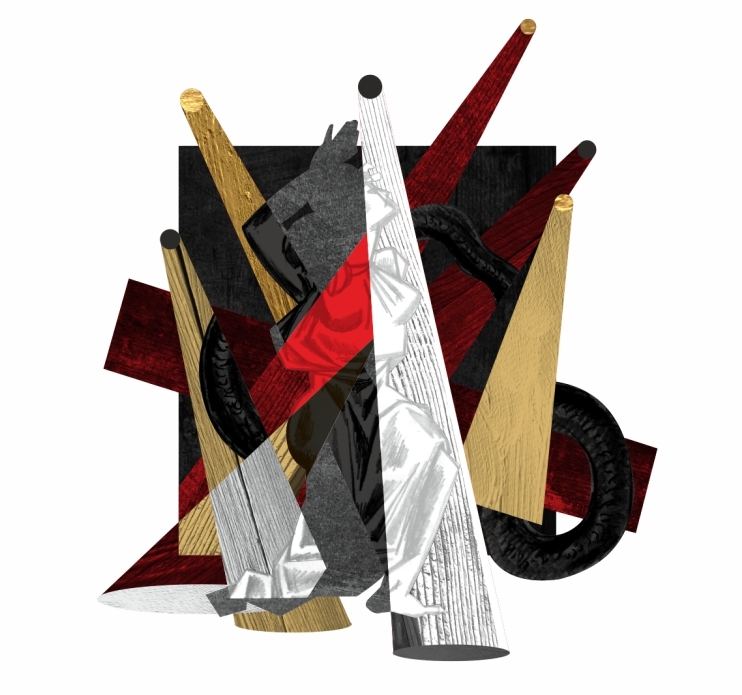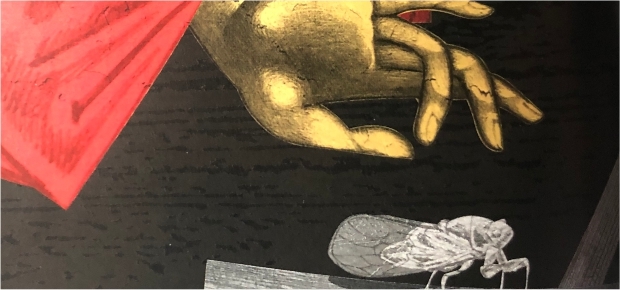Pourquoi 17
StarBast V
Publisher:
StarBast Publishers
StarBast Publishers
Pourquoi 17
Holger Schmidt
Published: 2024
Originally published in German and translated to Russian by S. Sokolov and N. Dulesov
Translated into English by Y. Grigoryeva
Illustrated by Dmitry Chursin
Cover & book design by Dmitry Chursin
Printed and bound in Russian Federation
by StarBast Publishers (Ekaterinburg)
Translated into English by Y. Grigoryeva
Illustrated by Dmitry Chursin
Cover & book design by Dmitry Chursin
Printed and bound in Russian Federation
by StarBast Publishers (Ekaterinburg)
Copyright © 2024 by StarBast Publishers
Idea, text, lyrics & music copyright © N. Dulesov 2023
Text copyright © “Holger Schmidt” 2023
Illustrations copyright © Dmitry Chursin 2023
Cover and book design copyright © Dmitry Chursin 2023
Text copyright © “Holger Schmidt” 2023
Illustrations copyright © Dmitry Chursin 2023
Cover and book design copyright © Dmitry Chursin 2023
After the breakup of the cult rock band StarBast, its former guitarist, Schwarz Viper, returns to Cologne to become a professor at the Higher School of Music. Inspired by memories of his youth, he decides to launch an educational experiment: his students must create an album based on the old work of StarBast, but reinterpreted in a modern context. However, his ambitious project soon encounters inexplicable and mystical events.
Holger Schmidt, having traveled to Galway for an interview with a famous filmmaker, unexpectedly runs into Schwarz at the funeral of his uncle. As it turns out, this man was the very filmmaker Holger had planned to interview. From this moment on, a series of strange coincidences unfolds, leading to the disappearance of Lena, one of Schwarz’s students.
Through a series of dialogues and "lectures," Schwarz immerses his students and Holger in reflections on music, philosophy, and the meaning of life. They face unexpected mysteries that merge past and present: from chess games turning into musical scores to discussions of synchronicity and the significance of the number 17. Gradually, the characters begin to realize that mystical forces are tied to the events in their lives, connected to their musical past and unresolved questions.
Lena’s disappearance, mysterious musical symbols, and enigmatic coincidences become part of a larger story about the search for lost inspiration and youthful ideals. They ask themselves: is it possible to regain that purity and sincerity that once existed, or is the past always just a shadow, impossible to reclaim?
The novel draws inspiration from the ancient myth of Orpheus and Eurydice, exploring themes of loss and return, art and fate. It’s a story about the search for truth and redemption, about the attempt to revive the past through music that was written over 30 years ago but finds new life in the present.
Holger Schmidt, having traveled to Galway for an interview with a famous filmmaker, unexpectedly runs into Schwarz at the funeral of his uncle. As it turns out, this man was the very filmmaker Holger had planned to interview. From this moment on, a series of strange coincidences unfolds, leading to the disappearance of Lena, one of Schwarz’s students.
Through a series of dialogues and "lectures," Schwarz immerses his students and Holger in reflections on music, philosophy, and the meaning of life. They face unexpected mysteries that merge past and present: from chess games turning into musical scores to discussions of synchronicity and the significance of the number 17. Gradually, the characters begin to realize that mystical forces are tied to the events in their lives, connected to their musical past and unresolved questions.
Lena’s disappearance, mysterious musical symbols, and enigmatic coincidences become part of a larger story about the search for lost inspiration and youthful ideals. They ask themselves: is it possible to regain that purity and sincerity that once existed, or is the past always just a shadow, impossible to reclaim?
The novel draws inspiration from the ancient myth of Orpheus and Eurydice, exploring themes of loss and return, art and fate. It’s a story about the search for truth and redemption, about the attempt to revive the past through music that was written over 30 years ago but finds new life in the present.
The goons exchanged glances and surprisingly easily agreed, heading immediately to the exit and discussing on the go, which bar to drop on next. Meanwhile, in the absolute silence of the bar, where the lights went out at that moment, multi-coloured spotlights began to flash; seven colours of the rainbow corresponding to seven notes flickered in the rhythm of classical blues, illuminating the faces of visitors with different colours and combinations of shades. The musicians joined in, picking up the chords of the light chaser. To the first sounds of their instruments, transformed Lena appeared on the stage. She was barefoot, with a bleached face and body and a saffron cape thrown over it, depicting a toga or robe of a Buddhist monk, with a wreath of white asphodels. Around herself she wrapped a piece of hemp rope, which, apparently, was supposed to represent a snake. Lena began to sing. I stood mesmerised looking at this performance and catching a long familiar motif in the melody of the song. I did not pay attention to the fact that Schwartz, having received a mobile call and continuing the conversation on the go, extremely agitated, disappeared behind the door of the office.

p. 150-151
“An oasis of spring in the middle of the gloomy drizzling autumn of a medieval city, covered with the high-tech hood of our futuristic dream of paradise which we could save from the troubles of earthly life, preserve, hide in it from this very life, save a small flame of our love, our longing, our pain and our happiness – forever. This lost world of tropical fragrances and birds chirping, of parrots fluttering from branch to branch – captivated, relaxed, and took you far away, to the place where you once were, leisurely strolling in this sweet nowhere in the midst of the frowning German order, cold grey structures and pointed Gothic spires of distant times, greyer, more gloomy, compared to which modern coldness seemed to be the whim of a child, to spite his parents, ridiculously and absurdly copying their ostentatious coldness caused by his pranks. And meanwhile, the real horror of nothingness, blood and abyss, the fear of war, lawlessness and poverty, a real plague and leprosy, not figurative or metaphorical, which consumed hundreds of thousands of lives for lack of millions at its disposal – all these ancient ghosts and shadows were invisibly here, they crowded behind a thin glass partition.
I looked around and was amazed at the company I found myself in. Schwarz's students, Peter Kalm, Boris Wild, Eli Zajonc, Derek Gross and Gerhard Rabbe, were standing next to me, also looking around in surprise and blindly.”
I looked around and was amazed at the company I found myself in. Schwarz's students, Peter Kalm, Boris Wild, Eli Zajonc, Derek Gross and Gerhard Rabbe, were standing next to me, also looking around in surprise and blindly.”

p. 70-71
“A black cat sneaking down the stairs in the light of daylight lamps, which is never on during the daytime and which reigns at nights in the empty corridors of public buildings, flooding with a dead glow everything that at other hours is designed to support life in the artificial body of the Golem of civilization, standing guard over Culture, so that it be (not) swept by the sands of Atlantis, went to the locked door and rubbed herself against it – both in the basement and in the attic. The next moment, the electronic locks clicked and the lights went out in the whole building for a second, until the backup generators started working. This was enough for the two groups of bacchantes to enter the intensive care unit of neurosurgery and rush towards each other – from Heaven and from the depths of Tartarus. And somewhere in the middle between the two starting points, they were supposed to meet at the Schwartz Space Station – at the point of convergence of all worlds.”

p. 186-187







